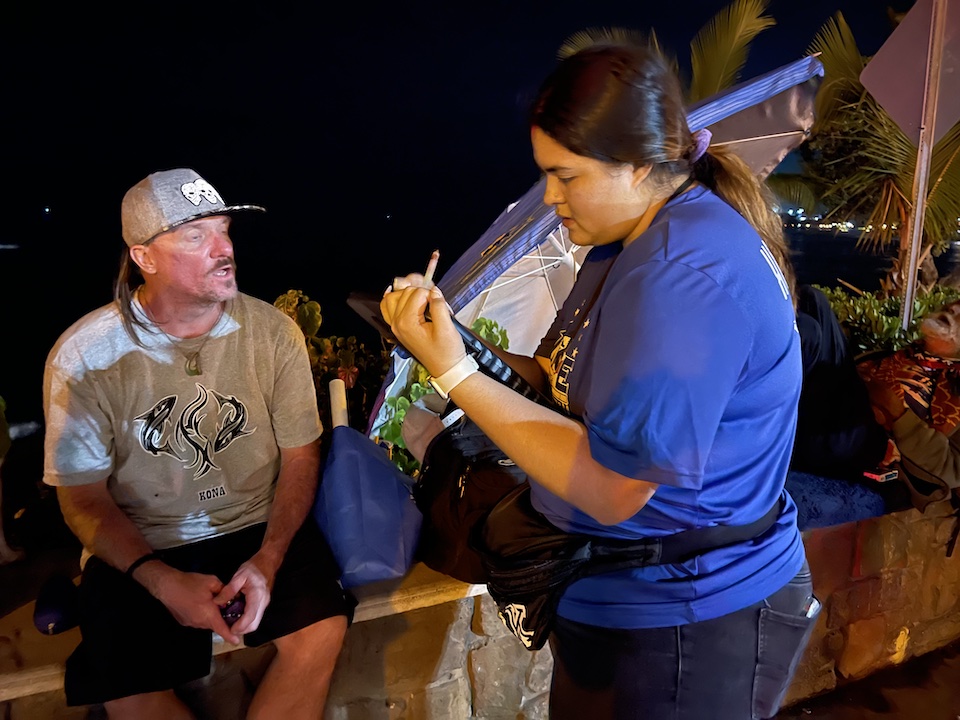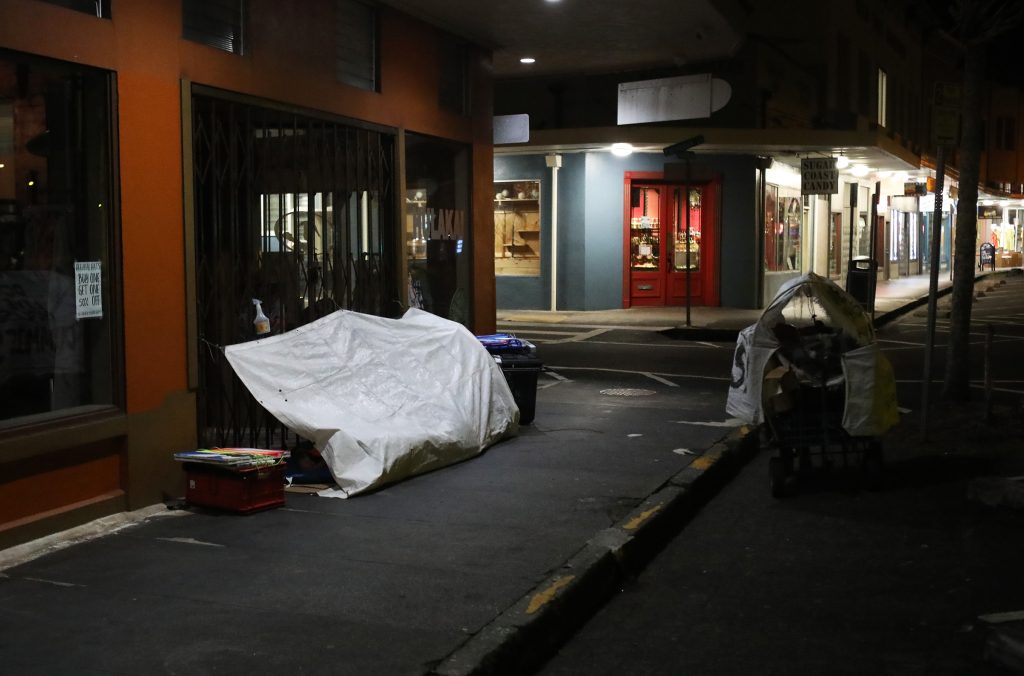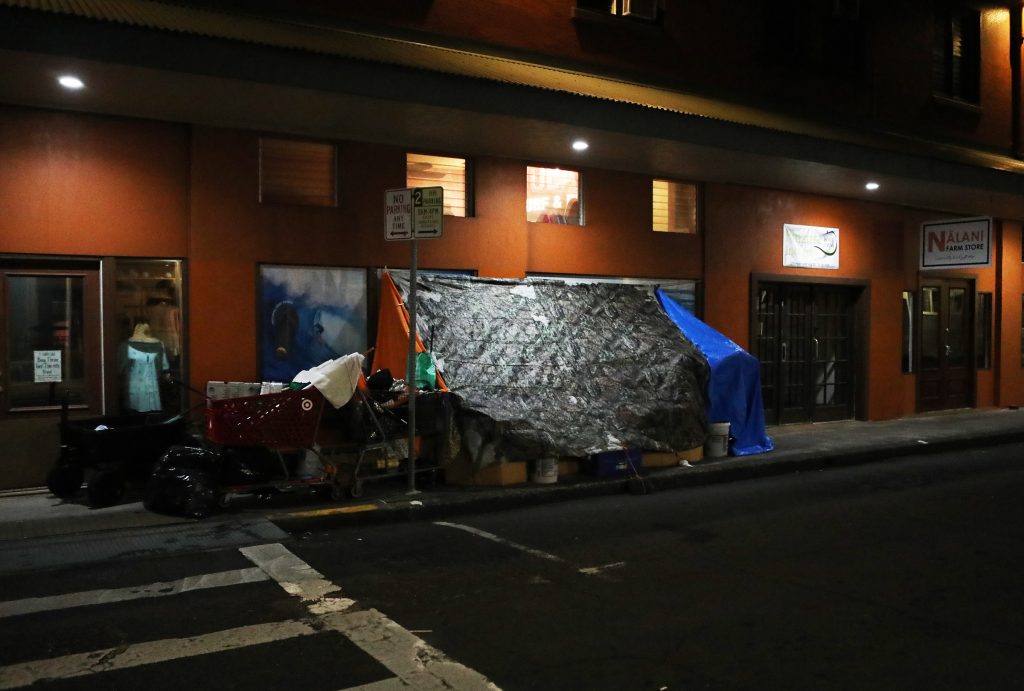Accusations of misconduct and exclusions postpone Hawaiʻi County funding to nonprofits
The Hawaiʻi County Council last week postponed voting on the appropriation of $10.5 million for nonprofits addressing housing and homelessness until this Friday, after hearing testimony that accused a former county division manager and an intended funding recipient of idea theft, misuse of power and cronyism.

Charis Higginson, founder of the West Hawaiʻi nonprofit Humanity Hale, testified that she was invited to a March meeting by Sharon Hirota, the former division manager with the Office of Housing and Community Development, which recommends recipients for the each cycle of the Homelessness and Housing Fund.
During that meeting, which also was attended by Paul Norman, Executive Director of Neighborhood Place of Puna, Higginson said she turned over her 43-page plan for a transitional youth housing program for those aging out of the foster system.
Higginson said she was later told by Hirota, who worked under the Roth Administration, that there was no funding available for her type of program.
A little over a week ago, she received an email that included an official list of proposed programs and recipients on the council agenda. She was surprised that one award of nearly $400,000 was to the Neighborhood Place of Puna for its new Anchor Point Youth Program — which Higginson claims was created from her plans.
“[Norman] took my entire plan to implement as his own, something he is known for in this community,” she told the council. “This was a betrayal of trust and a theft of my intellectual property. That meeting was nothing more than a strategic setup—a calculated move to take my ideas, hand them to Sharon’s cohort, and shut me out of the grant process entirely.”
Norman said Friday, during an interview with Big Island Now, that the “idea stemmed from the work we did last year through our outreach program, which give us a sense of how many people are on street without housing, and how many of them are youth.
“There were 65 unhoused families with 140 keiki in total as of December 2024. We have a family resource center, but for kids who are running away from bad situations, this new program would be our way to get youth in the door and reconnect them with the support they need and get a better a sense of what youth homelessness looks like.”
Higginson told the council she has evidence to prove the funding provided for the Anchor Point Youth Program was secured under false pretenses and rightfully belongs to her organization. She said she is prepared to take legal action to hold them accountable.
When discussing the resolution during the County Council meeting on Jan. 22, Councilmember Heather Kimball to move to postpone the vote on the funding until Jan. 31 for “matters to be resolved.”
It was seconded by Councilmember Rebecca Villegas, who said: “In my perception, this postponement is being asked for related to serious accusations made today by a testifier relating to misconduct, potential theft and exclusions of certain service providers as it relates to allocation of the funds.”
For this round of funding, the third from the county’s five-year Homelessness and Housing Fund, a proposal review committee comprised of representatives from the Mayor’s office, Parks and Recreation and the Office of Housing and Community Development used a publicly available scoring rubric to assess and rank 30 proposals. The top 15 were chosen for funding.

For the past two rounds of funding, about 34% has gone to two organizations: HOPE Services Hawaiʻi receiving $4.1 million and Neighborhood Place of Puna receiving more than $1.7 million.
The current resolution for funding, which comes from residential tier 2 property tax revenues, would be distributed in the form of 15 grant awards to nine nonprofit organizations.
Under this year’s proposed allocations, Neighborhood Place of Puna is set to receive $3.1 million for four programs and HOPE Services Hawaiʻi is being awarded $2.6 million for three programs. The combined $5.7 million is more than half of the total available funding.
“I have spoken out quite vociferously about my belief that there is a monopolizing of the majority of funding to certain organizations,” Villegas said. “I have talked to a number of small organizations that provide homeless services that feel they are being black-balled and excluded.”
She said the county needs to “break up the monopoly of funding allocation” and provide resources to other nonprofits that can provide a “diversity of services for the diverse needs of our unhoused demands.”
She added: “The lionʻs share of the funding for homeless service providers is allocated to east side of island, and District 7 (Kona and South Kona) suffers.”

Councilmember Jenn Kagiwada opposed the postponement due to the concern that it would cause a halt in services to the populations served by these nonprofits as well as the employees working at these 15 programs.
Housing Administrator Kehaulani Costa told the council: “We have a number of programs that are currently under contract in year 2 of this fund, some of the emergency shelters, 11 programs that would be re-awarded funds for programs.
“Contracts end on Jan. 31 and there is concern that some of those programs or services would be stopped or impacted until we get the awards and contracts out to providers.”
During the Finance Committee meeting on Jan. 7, Villegas also questioned the return on investment of these programs.
“We have an obligation to hold organizations funded with tens of millions of dollars accountable,” she said. “I know it’s a tough job, but millions are filtering down and we are not seeing results.”
According to the most recent Office of Housing and Community Development Impact Report, 2,399 individuals without stable housing were encountered from May 2023 to Feb. 2024. Through the collective efforts to assist them from agencies and organizations, 137 households
households were connected to stable shelter, which includes emergency shelters, transitional housing, recovery and stabilization programs, and long-term stable housing.
“The majority of awardee projects selected are not inherently designed to be pathways into immediate housing placements,” said Regina Weller, executive director of 808 Homeless Taskforce. “The projects primarily focus on services. Individuals receive services, yet remain in the same homeless status.”
She continued: “It’s the revolving door of services with no offer of a roof over oneʻs head. This kind of decision-making is not in alignment with the [Office of Housing and Community Development’s] own purpose and goal to ‘ensure homelessness is rare, brief and non-recurring.'”
The $17 million in total funds allocated to homeless organizationsʻ projects from July 2022 to December 2024 is expected to yield fewer than 400 individuals into stable housing, according to Weller.
“The solution to homelessness is a whole system approach that starts with identifying who is on the street, moving them to stable housing and focusing on supporting their needs so they can stay housed,” Norman said. “The reported numbers are just part of the picture. I donʻt think many people realize that we are highly trained professionals working with people who are traumatized and in precarious situations and it takes skill to navigate that and time to build trust.”

Higginson was the only dissenting testifier to speak during the County Council meeting, while several employees and volunteers spoke in favor of the programming from the Neighborhood Place of Puna and HOPE Services Hawaiʻi.
“This isn’t just my fight,” Higginson said. “It’s a fight for every grassroots organization and community member who is tired of being overlooked. Nepotism and cronyism have plagued our system for decades, and it’s time for change.”
She explained that after seeing keiki experience abuse in foster families, she had a vision that would stop the cycle of foster care to homelessness before it could start through her nonporfit, Humanity Hale.
“I have developed a comprehensive transitional housing plan, including a 10-acre farm with four homes ready for purchase for $550,000,” she said. “This space could house 6 to 8 children immediately. With an additional $350,000, we could build 16 more homes for 24 foster youth. This isn’t just a plan; it’s a solution to stop homelessness before it starts.”
Her plan includes healing programs, therapy sessions, development of job skills and opportunities to learn what it means to be an independent person.
“It is more difficult to rehabilitate adults who have made families on the streets and have grown accustomed to their life,” Higginson said. “We do have the ability to give kids the tools they need to evade street life all together and become emotionally-regulated with plenty of job and life skills to get a better start on life.”
The resolution now calls for the awards to go to:
- Big Island Substance Abuse Council
- $1,200,000 for Hula Ke Ola
- $250,000 for the Mohala Family Resource Center
- Bridge House, Inc
- $37,061 for a recovery housing program
- Going Home Hawaiʻi
- $867,715 for a re-entry and recovery housing program
- HOPE Services Hawaiʻi, Inc
- $1,147,224 for the West Hawaiʻi Emergency Housing Program
- $578,964 for the Hale Maluhia Emergency Shelter
- $896,225 for the Keolahou Emergency Shelter and Hale Kulike
- Lokahi Treatment Centers
- $261,000 for a recovery and housing stability program
- Men of Paʻa
- $875, 000 for Hoʻokanaka Reentry: Reintegration, Recovery and Housing
- Neighborhood Place of Puna
- $685,449 for the ʻOhana Homelessness Prevention and Support Program
- $794,289 for the Coordination Center
- $1,215,088 for the Homeless Engagement Team
- $387,455 for the Anchor Point Youth Program
- Project Vision Hawaiʻi
- $367,138 for street outreach from Hilo to Kona
- Salvation Army Family Intervention
- $437,391 for the transitional housing program
Villegas reiterated that she supports the allocation of these resources to helping nonprofits working to battle homelessness, but does not believe the current pattern of bulk allocations is the best course of action for the county. She also spoke on putting funding allocations on separate resolutions, so that postponing funding does not impact organizations that have not been called out.
Kagiwada still opposed and was skeptical that any of these problems could be addressed by Jan. 31. and they should be looking to the next round of funding to handle these issues.
Kagiwada also noted that it was her understanding that Higginson did not apply for funding in the last two rounds, which was confirmed by Costa. However, Council Chair Dr. Hoʻoleka Inaba said the vote for postponement is not directly related to one particular application and will allow them time to take a thorough review of all proposed recommendations.
Councilmember Dennis “Fresh” Onishi then expressed concerns that these nonprofits are reliant on county funding to continue the work since this current five-year funding plan for housing and homelessness will only be available through 2027.
“I guess for housing, when you folks get these nonprofits to participate in the program, they have to understand it’s not guaranteed that every year you get this for a lifetime,” Onishi said. “Sooner or later, you have to start standing on your own two feet.”
Council Chair Inaba said: “We donʻt want services to end. That is why we are postponing until next Friday. In the interim, Housing will be working to prepare the contracts, so should council pass it next Friday, they are ready to execute and funding and services can continue.”
Councilmembers Michelle Galimba, Ashley Kierkiewicz, Kimball, Inaba, Onishi and Villegas voted for the postponement with councilmembers James Hustace and Kagiwada voting no. Councilmember Kalanianliʻi-Kleinfelder was absent.
Those interested in watching the last County Council meeting can access the video footage and agenda along with other archived meetings spanning back to 2015.
Editorʻs note: An earlier version incorrectly stated that the testimony caused Councilmember Heather Kimball to motion for a postponement of the vote.
Editorʻs note: Sharon Hirota is still with the County in a position with the Department of Housing and Community Development.
Sponsored Content
Comments











_1770333123096.webp)


